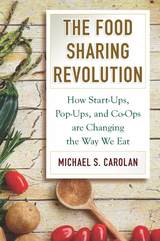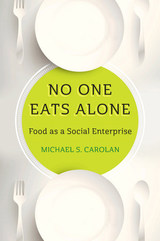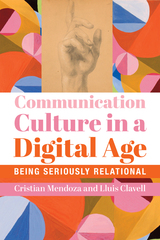2 books by Carolan, Michael S.

The Food Sharing Revolution
How Start-Ups, Pop-Ups, and Co-Ops are Changing the Way We Eat
Michael S. Carolan
Island Press, 2018
Marvin is a contract hog farmer in Iowa. He owns his land, his barn, his tractor, and his animal crates. He has seen profits drop steadily for the last twenty years and feels trapped. Josh is a dairy farmer on a cooperative in Massachusetts. He doesn’t own his cows, his land, his seed, or even all of his equipment. Josh has a healthy income and feels like he’s made it.
In The Food Sharing Revolution, Michael Carolan tells the stories of traditional producers like Marvin, who are being squeezed by big agribusiness, and entrepreneurs like Josh, who are bucking the corporate food system. The difference is Josh has eschewed the burdens of individual ownership and is tapping into the sharing economy.
Josh and many others are sharing tractors, seeds, kitchen space, their homes, and their cultures. They are business owners like Dorothy, who opened her bakery with the help of a no-interest, crowd-sourced loan. They are chefs like Camilla, who introduces diners to her native Colombian cuisine through peer-to-peer meal sharing. Their success is not only good for aspiring producers, but for everyone who wants an alternative to monocrops and processed foods.
The key to successful sharing, Carolan shows, is actually sharing. He warns that food, just like taxis or hotels, can be co-opted by moneyed interests. But when collaboration is genuine, the sharing economy can offer both producers and eaters freedom, even sovereignty. The result is a healthier, more sustainable, and more ethical way to eat.
In The Food Sharing Revolution, Michael Carolan tells the stories of traditional producers like Marvin, who are being squeezed by big agribusiness, and entrepreneurs like Josh, who are bucking the corporate food system. The difference is Josh has eschewed the burdens of individual ownership and is tapping into the sharing economy.
Josh and many others are sharing tractors, seeds, kitchen space, their homes, and their cultures. They are business owners like Dorothy, who opened her bakery with the help of a no-interest, crowd-sourced loan. They are chefs like Camilla, who introduces diners to her native Colombian cuisine through peer-to-peer meal sharing. Their success is not only good for aspiring producers, but for everyone who wants an alternative to monocrops and processed foods.
The key to successful sharing, Carolan shows, is actually sharing. He warns that food, just like taxis or hotels, can be co-opted by moneyed interests. But when collaboration is genuine, the sharing economy can offer both producers and eaters freedom, even sovereignty. The result is a healthier, more sustainable, and more ethical way to eat.
[more]

No One Eats Alone
Food as a Social Enterprise
Michael S. Carolan
Island Press, 2017
In today’s fast-paced, fast food world, everyone seems to be eating alone, all the time—whether it’s at their desks or in the car. Even those who find time for a family meal are cut off from the people who grew, harvested, distributed, marketed, and sold the foods on their table. Few ever break bread with anyone outside their own socioeconomic group. So why does Michael Carolan say that that no one eats alone? Because all of us are affected by the other people in our vast foodscape. We can no longer afford to ignore these human connections as we struggle with dire problems like hunger, obesity, toxic pesticides, antibiotic resistance, depressed rural economies, and low-wage labor.
Carolan argues that building community is the key to healthy, equitable, and sustainable food. While researching No One Eats Alone, he interviewed more than 250 individuals, from flavorists to Fortune 500 executives, politicians to feedlot managers, low-income families to crop scientists, who play a role in the life of food. Advertising consultants told him of efforts to distance eaters and producers—most food firms don’t want their customers thinking about farm laborers or the people living downstream of processing plants. But he also found stories of people getting together to change their relationship to food and to each other.
There are community farms where suburban moms and immigrant families work side by side, reducing social distance as much as food miles. There are entrepreneurs with little capital or credit who are setting up online exchanges to share kitchen space, upending conventional notions of the economy of scale. There are parents and school board members who are working together to improve cafeteria food rather than relying on soda taxes to combat childhood obesity.
Carolan contends that real change only happens when we start acting like citizens first and consumers second. No One Eats Alone is a book about becoming better food citizens.
Carolan argues that building community is the key to healthy, equitable, and sustainable food. While researching No One Eats Alone, he interviewed more than 250 individuals, from flavorists to Fortune 500 executives, politicians to feedlot managers, low-income families to crop scientists, who play a role in the life of food. Advertising consultants told him of efforts to distance eaters and producers—most food firms don’t want their customers thinking about farm laborers or the people living downstream of processing plants. But he also found stories of people getting together to change their relationship to food and to each other.
There are community farms where suburban moms and immigrant families work side by side, reducing social distance as much as food miles. There are entrepreneurs with little capital or credit who are setting up online exchanges to share kitchen space, upending conventional notions of the economy of scale. There are parents and school board members who are working together to improve cafeteria food rather than relying on soda taxes to combat childhood obesity.
Carolan contends that real change only happens when we start acting like citizens first and consumers second. No One Eats Alone is a book about becoming better food citizens.
[more]
READERS
Browse our collection.
PUBLISHERS
See BiblioVault's publisher services.
STUDENT SERVICES
Files for college accessibility offices.
UChicago Accessibility Resources
home | accessibility | search | about | contact us
BiblioVault ® 2001 - 2024
The University of Chicago Press









